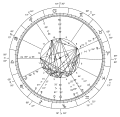This is an old revision of this page, as edited by Zachariel (talk | contribs) at 14:49, 2 July 2012 (Contribution of content concerning Richard Trewythian's practice of mundane astrology). The present address (URL) is a permanent link to this revision, which may differ significantly from the current revision.
Revision as of 14:49, 2 July 2012 by Zachariel (talk | contribs) (Contribution of content concerning Richard Trewythian's practice of mundane astrology)(diff) ← Previous revision | Latest revision (diff) | Newer revision → (diff)
Mundane astrology is the astrological study of heavenly cycles upon groups and nations, world affairs and world events. The name derives name from the Latin term mundus, 'world'.
History
Mundane astrology is widely believed by astrological historians to be the most ancient branch of astrology. Early Babylonian astrology was exclusively concerned with mundane astrology, being geographically oriented, specifically applied to countries cities and nations, and almost wholly concerned with the welfare of the state and the king as the governing head of the nation. Astrological practices of divination and planetary interpretation have been used for millennia to answer political questions, but only with the gradual emergence of horoscopic astrology, from the sixth century BC, did astrology develop into the two distinct branches of mundane astrology and natal astrology.
Techniques and principles
Astrologically, the affairs of a nation are judged from the horoscope set up at the time of its official inauguration or the birth chart of its leader, or various phenomena such as eclipses, lunations, great conjunctions, planetary stations, comets and ingresses.
The techiques of the subject were discussed in detail in the 2nd century work of the Alexandrian astronomer Ptolemy, who outlined its principles in the second book of his Tetrabiblos. Ptolemy set this topic before his discussion of individual birth charts because he argued that the astrological assessment of any 'particular' individual must rest upon prior knowledge of the 'general' temperament of their ethnic type; and that the circumstances of individual lives are subsumed, to some extent, within the fate of their community. The third chapter of his work offers an association between planets, zodiac signs and the national characteristics of 73 nations. It concludes with three assertions which act as core principles of mundane astrology:
- Each of the fixed stars has familiarity with the countries attributed to the sign of its ecliptic rising.
- The time of the first founding of a city (or nation) can be used in a similar way to an individual horoscope, to astrologically establish the characteristics and experiences of that city. The most significant considerations are the regions of the zodiac which mark the place of the Sun and Moon, and the four angles of the chart – in particular the ascendant.
- If the time of the foundation of the city or nation is not known, a similar use can be made of the horoscope of whoever holds office or is king at the time, with particular attention given to the midheaven of that chart.
Practice
The first English astrologer for whom we have evidence of astrological practice is Richard Trewythian, whose notebook is largely concerned with mundane astrology. He constructed horoscopes for the Sun's ingress into Aries over thirty years, and recorded general predictions for twelve of those years between 1430 and 1458. His notebooks demonstrate how he recorded the logic for his conclusions:
Pregnant women and boys will incur harm and severe dangers. This conclusion is drawn from the trine aspect between Saturn and Venus on the day of the ingress.
Concerning the wars of this year: they will be caused by the aspect of opposition of two heavy planets, which will occur on 27 March. And the time of the beginning of the war will be on the first day of May. This conclusion is drawn by the application of the greater luminary to Saturn. Merchants will be well disposed this year.
He also made several predictions concerning the king (Henry VI), such as one he made in 1433 where he noted: “it seems that the king will be sick this year because Saturn is lord of the tenth house”.
References
- Michael Baigent (1994). From the Omens of Babylon: Astrology and Ancient Mesopotamia. Arkana.
- Koch-Westenholz (1995), Mesopotamian Astrology, p.19.
- Michael Baigent, Nicholas Campion and Charles Harvey (1984). Mundane astrology. Thorsons.
- Steven Vanden Broecke (2003). The limits of influence: Pico, Louvain, and the crisis of Renaissance astrology. BRILL. pp. 185–. ISBN 978-90-04-13169-9. Retrieved 5 April 2012.
- Raphael, (1931) Mundane Astrology, pp.15-17. Fowlsham & Co.
- Ptolemy, Tetrabiblos II,1 (Loeb: p.119): "And since weaker natures always yield to the stronger, and the particular always falls under the general, it would by all means be necessary for those who purpose an inquiry about a single individual long before to have comprehended the more general considerations".
- Ptolemy, Tetrabiblos II.3 (Loeb: pp.157–161).
- ^ Sophie Page, 'Richard Trewythian and the Uses of Astrology in Late Medieval England', Journal of the Warburg and Courtauld Institutes Vol. 64, (2001), pp. 193-228. Published by The Warburg Institute. Stable URL: http://www.jstor.org/stable/751562.
External links
- 17th Century study in the Ancient Art of Mundane Astrology hosted by Skyscript (accessed 1 July 2012). The complete fourth book of William Ramesey's Astrologiae Restaurata, 'Astrology Restored' (London, 1653), edited and annotated by Steven Birchfield (1.43MB). The Fourth book is entitled Astrologia Munda, 'Mundane Astrology' - said by Birchfield to be the closest thing we have to an accessible textbook on traditional mundane astrology.
- Second book of Ptolemy's Tetrabiblos hosted by | Bill Thayer's LacusCurtius (accessed 1 July 2012). Most detailed source of ancient mundane astrology principles.
